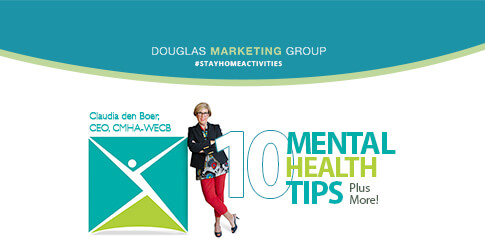

What can I do to improve my overall mental health?
balance and cope with stressful times.

manage stress
we all have stressors in our lives but learning how to deal with them when they threaten to overwhelm us will maintain our mental health.
volunteer
being involved in community gives a sense of purpose and satisfaction that paid work cannot.
give and accept support
friends and family relationships thrive when they are “put to the test”.
identify and deal with moods
we all need to find safe and constructive ways to express our feelings of anger, sadness, joy and fear.
build confidence
identify your abilities and weaknesses together, then build on them and do the best with what you have.
eat right, keep fit
a balanced diet, exercise and rest can help you to reduce stress and enjoy life.
create a meaningful budget
financial problems cause stress. Over-spending on our “wants” instead of our “needs” is often the culprit.
make time for family and friends
these relationships need to be nurtured; if taken for granted they will not be there to share life’s joys and sorrows.

ADDITIONAL TIPS
Laugh
Laughter often really is the best medicine. Even better is sharing something that makes you smile or laugh with someone you know.
Treat yourself well
Take some “you” time – whether it’s cooking a good meal, having a bubble bath or seeing a movie, do something that brings you joy.
Express yourself
Whether in a journal or talking to a wall, expressing yourself after a stressful day can help you gain perspective, release tension, and boost your body’s resistance to illness.
Set personal goals
Goals don’t have to be ambitious. They could be as simple as finishing a book, walking around the block every day, learning to play bridge, or calling your friends instead of waiting by the phone. Whatever goal you set, reaching it will build confidence and a sense of satisfaction.
Give yourself permission to take a break from your worries and concerns.
Recognize that dedicating even a short time every day to your mental fitness will reap significant benefits in terms of feeling rejuvenated and more confident.
"Collect" positive emotional moments
Make a point of recalling times when you have experienced pleasure, comfort, tenderness, confidence or other positive things.
Do one thing at a time
Be “present” in the moment, whether out for a walk or spending time with friends, turn off your cell phone and your mental “to do” list.
Enjoy hobbies
Hobbies can bring balance to your life by allowing you to do something you enjoy because you want to do it.
Adapted from: Canadian Mental Health Association Mental Fitness Tips.
For more info visit: https://cmha.ca/resources/mental-fitness-tips

DO YOU
NEED HELP
OR KNOW
SOMEONE
THAT DOES?

CMHA-WECB Information and Referral Services
(through Coordinated Access located at the Crisis and Mental Wellness Centre – Transitional Stability Centre)*:
519-973-4435
www.windsoressex.cmha.ca![]()
Community Crisis Centre
(Hotel-Dieu Grace Healthcare)
519-973-4435![]()
Regional Children’s Centre
(Hotel-Dieu Grace Healthcare)
519-257-KIDS![]()
Connex Ontario Health Services
Information:
www.connexontario.ca/help
Connex – Mental Health Line:
1-866-531-2600![]()
Gambling Help Line:
1-888-230-3505![]()
Drugs or Alcohol Help Line:
1-800-565-8603
CMHA-WECB Information and Referral Services
(through Coordinated Access located at the Crisis and Mental Wellness Centre – Transitional Stability Centre)*:
519-973-4435
www.windsoressex.cmha.ca![]()
Community Crisis Centre
(Hotel-Dieu Grace Healthcare)
519-973-4435![]()
Regional Children’s Centre
(Hotel-Dieu Grace Healthcare)
519-257-KIDS![]()
Connex Ontario Health Services
Information:
www.connexontario.ca/help
Connex – Mental Health Line:
1-866-531-2600![]()
Gambling Help Line:
1-888-230-3505![]()
Drugs or Alcohol Help Line:
1-800-565-8603
DO YOU
NEED HELP
OR KNOW
SOMEONE
THAT DOES?
